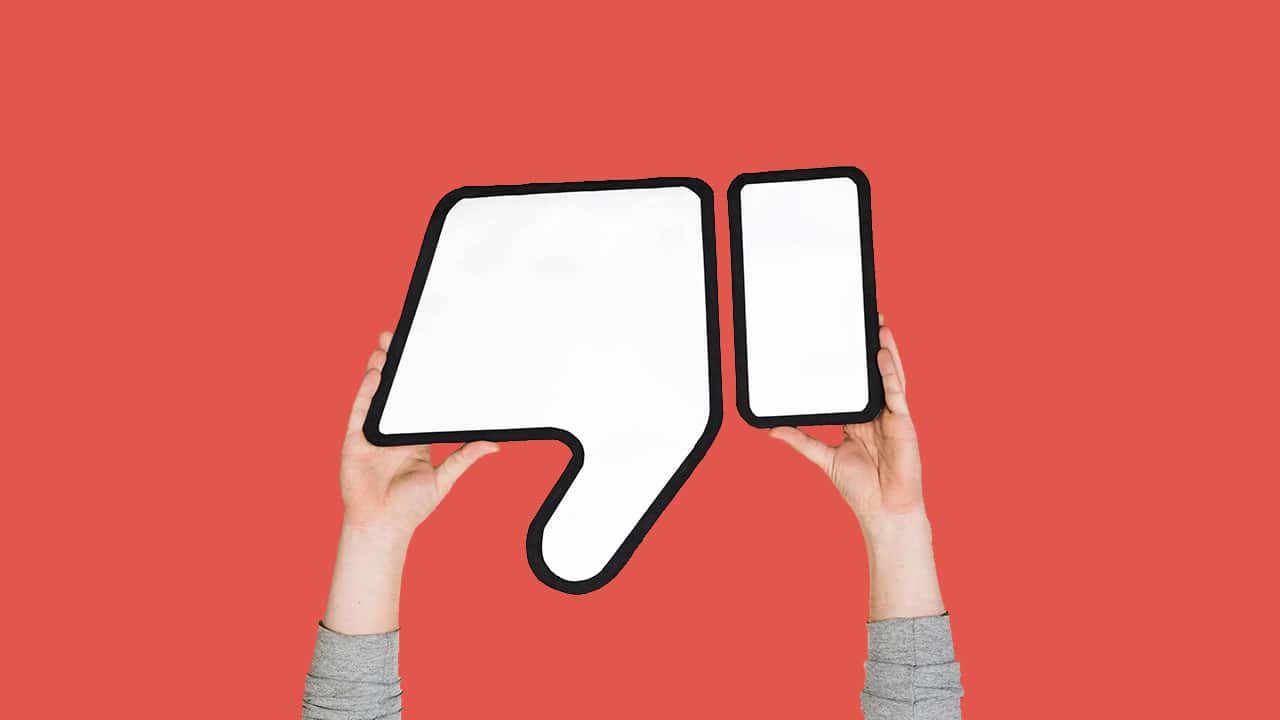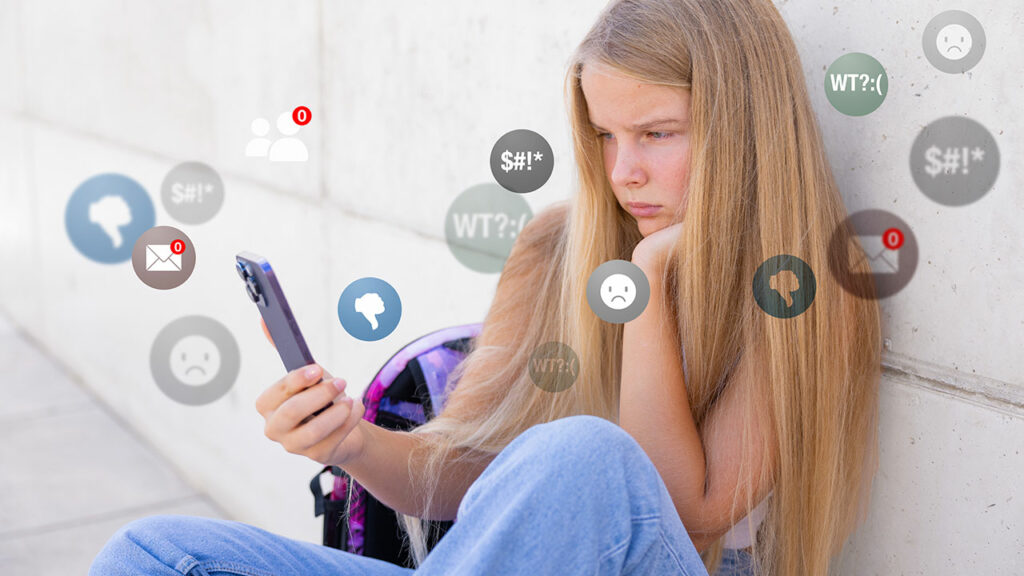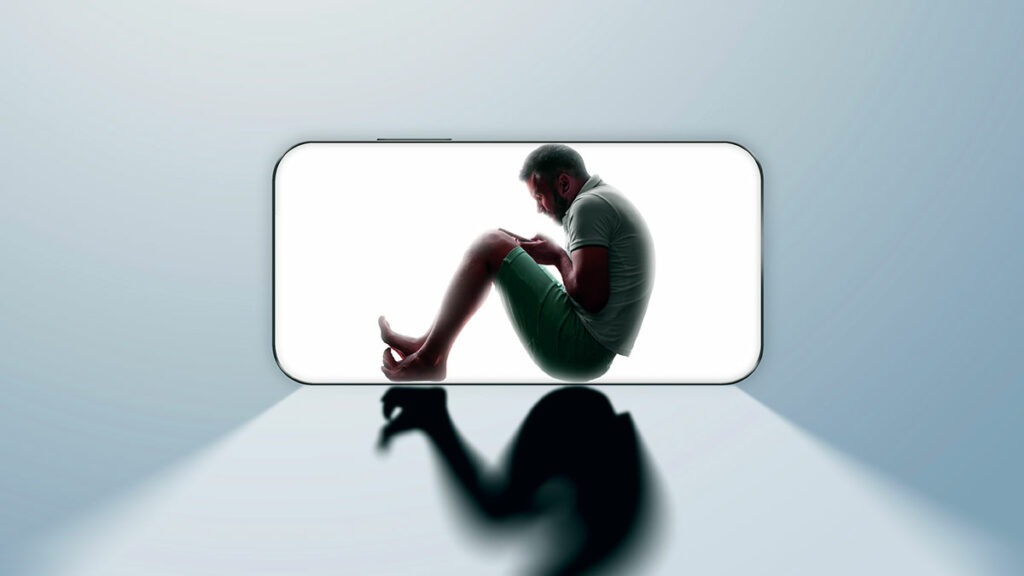
10 Negative Effects of Social Media
Social media is a divisive issue. While some people extol its benefits, others can only see negative repercussions and worry about the long-term damage it may cause. But why is social media bad for some users and not for others?
At Game Quitters, our expertise extends beyond video game addiction to tech overuse in general. In this article we explain 10 ways social media can cause harm.
What are the 10 negative effects of social media?

Although there are positive aspects of social media, it presents some significant risks. That’s why it’s important to know both the pros and cons of social media. So, how does social media have a negative impact on life? Here are 10 ways it can have a detrimental effect, including some negative effects of social media statistics.
1. Cyberbullying
Cyberbullying can include harassment (sending abusive, offensive, or threatening messages), doxing (posting someone’s private details without their consent), cyberstalking (unwanted attention that may continue offline), impersonating someone (setting up a fake account in their name), and even revenge porn (sharing sexually explicit images or video to humiliate an ex-partner) on sites like OnlyFans.
Cyberbullying can be triggered by homophobia, religion, race, or misogyny but sometimes it has more to do with the perpetrator than the person being abused. They may have been cyberbullied themselves, feel jealous of the victim, or simply get a kick from inflicting misery. Whatever the reason, the impact of cyberbullying on social media is far-reaching – it can cause emotional, psychological, and physical distress.
According to the Cyberbullying Research Center, online abuse is on the rise among US youth 1 1. https://cyberbullying.org/cyberbullying-continues-to-rise-among-youth-in-the-united-states-2023 × . A 2023 survey of 5,000 13- to 17-year-old US middle and high school students, revealed that 26.5% of respondents had been subject to cyberbullying in the past 30 days, compared to 23.2% in 2021, 17.2% in 2019, and 16.7% in 2016. The 2023 study found the most common types of cyberbullying that took place online were:
- mean or hurtful comments – 77.5%
- someone spreading malicious rumors – 70.4%
- being embarrassed or humiliated – 69.1%
- intentionally being excluded from a group activity – 66.4%
- being repeatedly contacted after telling someone to stop – 55.5%.
2. Age-inappropriate content
One of the other potential harms of social media is age-inappropriate content. Across platforms like YouTube, Instagram, TikTok, and Snapchat, children and teens can inadvertently encounter or deliberately search for content they’re not ready for developmentally. Images, videos, and other material that are directed at adults can be upsetting and disturbing for impressionable young minds. That’s why it’s important to set appropriate screen time guidelines based on age.
One of the risk factors of viewing age-inappropriate content is young people providing a false date of birth to gain access to social media platforms. A 2022 UK study by Ofcom found that 32% of 8- to 17-year-olds have a user age of 18+, after providing fake information when they initially registered 2 2. https://www.ofcom.org.uk/news-centre/2022/a-third-of-children-have-false-social-media-age-of-18 × .
3. Withdrawal from family and friends
Although one of the positive effects of social media is connectivity, overuse can cause a disconnect with friends and family. Hours spent scrolling and posting in the online world often creates friction in real-world relationships. Parents become increasingly frustrated when their child barely looks up from the screen and is monosyllabic during interactions. And real-life friends can feel excluded when those they were close to seem distant and unavailable. Online friendships are different from fact-to-face interactions as we miss out on body language and tone of voice so messages can be misconstrued, leading to misunderstandings and conflict.
In-person connection and support play an important role in child development and this can be lost when someone withdraws from friends and family. An increasing reliance on social media for connectivity and belonging can put a strain on existing relationships and make it difficult to develop new ones. This can lead to feelings of loneliness and isolation. ‘The Global State of Social Connections’ – a 2023 study by Gallup and Meta – highlights the prevalence of loneliness worldwide 3 3. https://www.gallup.com/analytics/509675/state-of-social-connections.aspx × . It found that 25% of respondents aged 15 to 18 years old feel “very lonely” or “fairly lonely”. How does social media affect you socially? Does it have a positive or negative impact on your relationships?
4. Lack of interest in other activities
It’s not just friends and family who can be neglected when an individual becomes hooked on social media. They can also start to lose interest in hobbies and activities they once enjoyed. The pull of checking for likes, follows, and updates can become all consuming, taking up more and more hours each day. Although some people can continue to pursue their passions on social networks, it’s not always the same experience. For example, following well-known hockey players on Instagram or watching game highlights on YouTube is different from training with teammates or playing hockey in person.
With the average US teen spending 4.8 hours a day on social platforms, it’s no wonder that other hobbies and interests are taking a back seat (4). So, we’ve put together 50 best screen-free activities by age and 60+ hobby ideas to help anyone wanting to reduce their social media use get a healthier tech-life balance.
5. Physical health problems
Excessive social media use may also cause physical health problems when individuals start to lead a more sedentary lifestyle. As shown above, hours spent scrolling can replace and interfere with more active hobbies. This can cause weight gain and obesity, which have serious health implications. In fact, a study by the University of Buffalo found that social media overuse may increase the risk of certain cancers, cardiovascular disease, and diabetes, and lead to more frequent visits to health centers for headaches and musculoskeletal problems like back and chest pains.
It’s not just inactivity that can negatively affect physical health, excessive social media use can also adversely impact diet and sleep. Taking a break to make a healthy meal may seem like too much effort – it can be quicker and easier to grab some junk food and soda. Even stopping to get a good night’s sleep is a struggle for those who are constantly checking social media, and some people even wake in the night for an update. Over time, this will lead to severe sleep deprivation, which can affect day-to-day functioning and physical health.
6. Mental health issues
The negative effects of social media on society are not only related to physical health problems, but the rise of psychological issues is also significant. So, how does social media have a negative impact on mental health? Although it can be a lifeline for some people, who feel a sense of belonging and connection in their online communities, it can make others feel lonely and isolated. This is because it can create a false sense of true engagement. And loneliness can be a contributing factor to mental health problems such as depression. A 2023 study that examined the association between social media use and loneliness among adults found that more time spent on social media was associated with more loneliness 4 4. https://www.ncbi.nlm.nih.gov/pmc/articles/PMC9817115/ × .
Young people are particularly vulnerable to the negative effects of social media on mental health because their self-worth is often linked to approval from others. The number of likes, follows, comments, and shares they receive can have a direct (and often adverse) impact on their emotional well-being. The negative effects of social media on youth mental health can also include lower self-esteem and comparison anxiety. Most people only post the positive aspects of our lives on social media, giving an unrealistic view of reality, which can make them seem more popular, attractive, or wealthy. Having a window into their near-perfect lives can compound matters for those already feeling inadequate.
7. FOMO
As mentioned above, young people have a greater tendency to compare themselves to others on social media and this can lead to FOMO (the fear of missing out). FOMO makes some individuals feel compelled to constantly checking their social media accounts. There are numerous reasons for FOMO, including missing important posts, direct messages, live chats, and news; not knowing what others are doing or saying; annoying someone by not responding immediately; being left out of discussions, jokes, and events; and losing popularity or influence. FOMO can lead to problematic use and cause those affected to miss out on real-life relationships and activities.
8. Negative body image
There are positive and negative effects of social media on body image. Although it can celebrate diverse body shapes, promote body positivity, and offer health and fitness advice, it can also negatively impact how users view their bodies. Negative issues occur because of the idealized (and often filtered and AI) images posted on social platforms like Instagram and Facebook, which can lead to unhealthy comparisons and self-esteem problems for those who may not match these unrealistic beauty standards.
Research in 2023 found a link between social media, body image, and eating disorders in young people 5 5. https://journals.plos.org/globalpublichealth/article?id=10.1371/journal.pgph.0001091 × . It recommended that because of on the scale of social media usage by youth, this issue should be considered an emerging global public health concern.
9. Unrealistic expectations
Let’s now look more at the negative effects of social media on self-esteem. Social media influencers – paid by brands to promote their products and services – post carefully curated content that can create unrealistic expectations. Many people fail to see the marketing ploy and instead think this portrayal of a flawless image and lifestyle is realistic. Constant comparisons can make them feel inadequate and lead to unrealistic expectations about their appearance, home, holidays, car, job, social life, etc. It can also distract users from their own choices and aspirations.
Influencers can significantly impact on their followers’ buying decisions. According to a report from Mintel, almost 50% of German and British consumers have purchased a product from an influencer they follow 6 6. https://www.mintel.com/media-content-producers-market-news/impact-of-influencer-marketing-on-consumers-purchasing-journey/ × . They can also encourage their followers to purchase products and services they neither need nor can afford.
10. Social media addiction
While social media is a fun way to keep in touch with friends, stay informed, and be entertained, overconsumption can start to affect the brain. Dopamine is a chemical in the brain responsible for motivation and reward, and people who constantly scroll through social media can deplete their dopamine level, which can make them feel low, bored, and anxious. They crave more of the dopamine ‘reward’ so keep bombarding their brain with pictures, videos, memes, ads, and captions, and needing more likes, comments, and interactions to experience the same rush of pleasure.
If you’re worried that you might be affected, check out the signs and symptoms of social media addictionand find out more about Instagram addiction, Snapchat addiction, TikTok addiction, and YouTube addiction.
Need help?

If you think you’re addicted to social media, you need to decide what to do – limit it or quit. Start by identifying the different platforms that are causing issues, and consider whether you need to continue using them. Sometimes it can be a relief to remove yourself from toxic situations, or sites that are taking up too much of your time.
How to limit your social media use
If you decide to limit your social media use, think about the positive aspects of your engagement, such as staying connected with friends and family from all over the world. Then reflect on the negative side of your interactions, like having heated debates with strangers, or going down a rabbit hole of endless short videos.
Work out which platform(s) you’re going to use for which purposes, then de-activate the ones you want to leave and log out of the ones that you’re keeping. So, each time you want to check your feeds, you have to log into your accounts. This will make you consider your actions rather than impulsively reaching for your phone whenever you have a spare moment. Over time you’ll engage more mindfully with content that enhances and adds value to your life.
How to quit social media
If you want to leave social media for good, it can be a difficult journey to take alone. Read Phil’s story about why he quit social media for inspiration. If your social media problems are deep rooted, you may need professional support.
